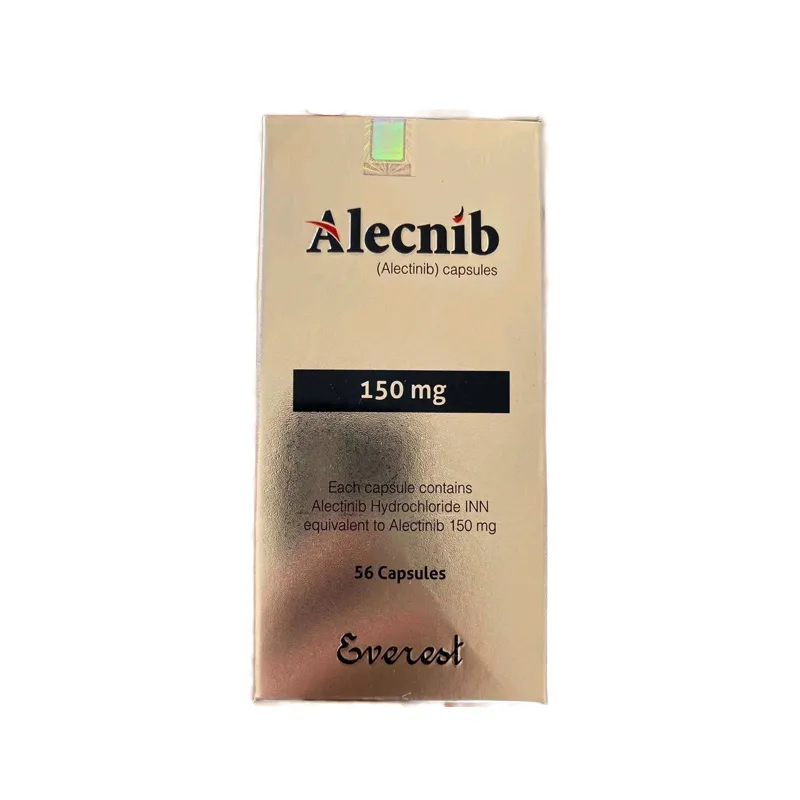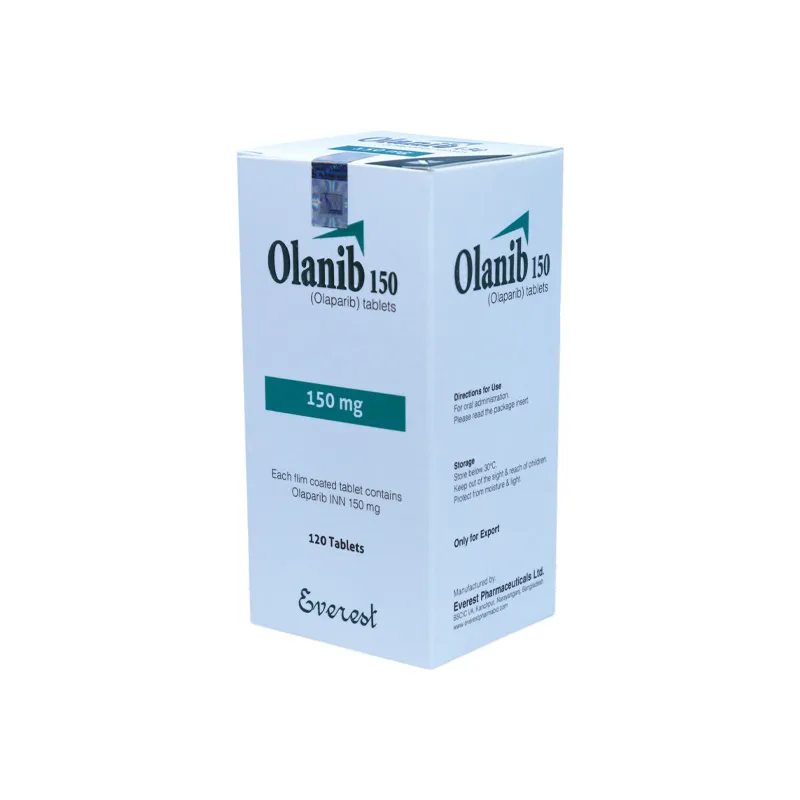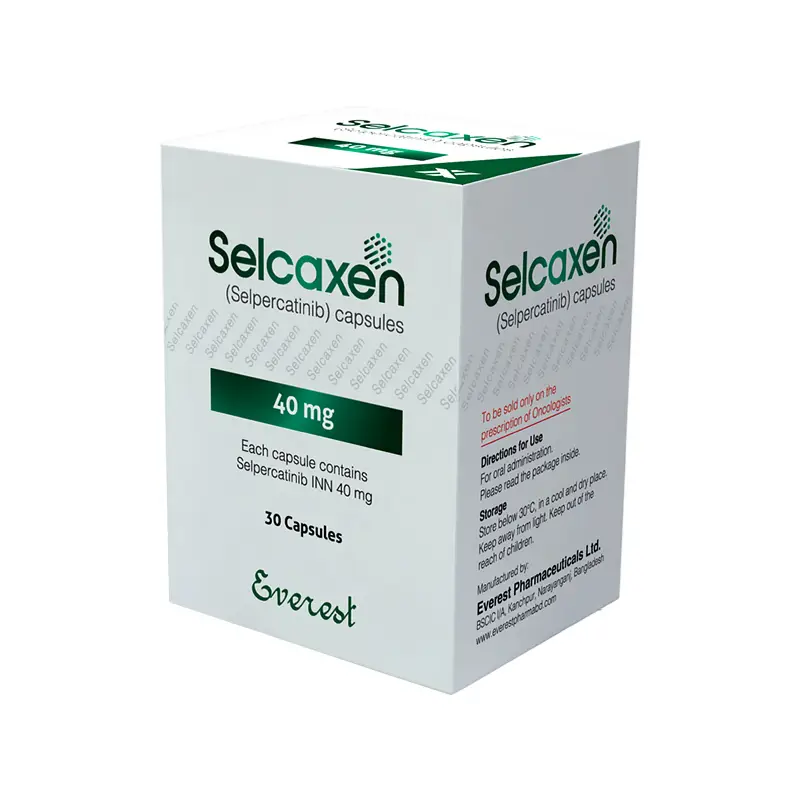Buy Generic Ribociclib
Inquire NowTable of Contents
ToggleWhat Is Ribociclib?
Ribociclib is a selective inhibitor of cyclin-dependent kinases 4 and 6 (CDK4/6), which are key regulators of the cell cycle. It was approved by the US Food and Drug Administration (FDA) in 2017 for the treatment of hormone receptor-positive, human epidermal growth factor receptor 2-negative (HR+/HER2-) advanced or metastatic breast cancer in combination with an aromatase inhibitor.
Ribociclib works by blocking the CDK4/6 pathway, which prevents the progression of cancer cells from the G1 to the S phase of the cell cycle, resulting in cell cycle arrest and ultimately cell death. Clinical trials have shown that ribociclib in combination with an aromatase inhibitor can significantly improve progression-free survival compared to the use of an aromatase inhibitor alone in patients with HR+/HER2- advanced or metastatic breast cancer. However, ribociclib can cause various side effects, including neutropenia, leukopenia, fatigue, and nausea, among others.
Generic Ribociclib Vs. Brand Ribociclib
Generic ribociclib (HER-2N) and brand ribociclib are both the same drug, with the same active ingredient, which is a selective inhibitor of cyclin-dependent kinases 4 and 6 (CDK4/6). The brand name of ribociclib is Kisqali, which is manufactured by Novartis. When a drug is first developed and approved by regulatory agencies like the FDA, it is given a brand name by the manufacturer to distinguish it from other drugs on the market. Once the patent on the drug expires, other companies can produce generic versions of the drug, which contain the same active ingredient, dosage form, and route of administration as the brand-name drug, but are sold under a different name. “Least-developed country (LDC) members of the WTO will be allowed to maintain maximum flexibility in their approach to patenting pharmaceutical products until at least 2033, following a decision taken by the WTO’s Council for Trade-Related Aspects of Intellectual Property Rights (TRIPS) on 6 November.” Reference: https://www.wto.org/english/news_e/news15_e/trip_06nov15_e.htm
Generic drugs are usually less expensive than their brand-name counterparts, as they don’t require the same investment in research and development, marketing, and other expenses that go into the development and launch of a new drug. However, generic drugs are still required to meet the same standards of safety, efficacy, and quality as the brand-name drug.
Indication And Usage
Ribociclib is indicated as an initial endocrine-based therapy in combination with an aromatase inhibitor for the treatment of postmenopausal women with hormone receptor-positive, human epidermal growth factor receptor 2-negative (HR+/HER2-) advanced or metastatic breast cancer.It is also indicated for use in combination with fulvestrant as a subsequent therapy in patients with HR+/HER2- advanced or metastatic breast cancer following disease progression on or after initial endocrine-based therapy. In both cases, ribociclib is used to inhibit the CDK4/6 pathway and slow the progression of cancer cells.
Ribociclib should be used under the supervision of a healthcare provider experienced in the use of anticancer therapies. The recommended dosage is 600 mg (three 200 mg tablets) once daily for 21 consecutive days, followed by 7 days off treatment. The tablets should be taken with food, and the treatment should continue until disease progression or unacceptable toxicity. Ribociclib may cause various side effects, including neutropenia, leukopenia, fatigue, nausea, and vomiting, among others. Patients should be monitored regularly for signs of infection or other adverse effects, and the dose may need to be adjusted or the treatment may need to be discontinued if severe side effects occur.
Pharmacology Of Ribociclib
Ribociclib is a selective inhibitor of cyclin-dependent kinases 4 and 6 (CDK4/6), which are key regulators of the cell cycle. CDK4/6 complexes with cyclin D1 are activated by mitogenic signaling pathways and promote progression of the cell cycle from the G1 to the S phase. Inhibition of CDK4/6 activity can induce cell cycle arrest, preventing progression of cancer cells through the cell cycle and ultimately leading to cell death.
Ribociclib specifically binds to the ATP-binding pocket of CDK4/6, inhibiting their activity and preventing phosphorylation of retinoblastoma protein (Rb), a tumor suppressor that regulates the G1 to S phase transition. This results in a decrease in the expression of genes that promote cell proliferation and an increase in the expression of genes that induce cell cycle arrest and apoptosis.
It is highly selective for CDK4/6, and does not significantly inhibit other CDKs or non-CDK kinases at clinically relevant concentrations. This selectivity allows for effective inhibition of the CDK4/6 pathway without significant off-target effects.
The pharmacokinetics of ribociclib are characterized by rapid absorption and a mean elimination half-life of approximately 32 hours. It is primarily metabolized by CYP3A4 and excreted in feces and urine. Ribociclib should be taken with food to enhance its absorption, and caution should be used when co-administered with strong CYP3A4 inhibitors or inducers, as they can affect its metabolism and increase the risk of adverse effects.
Dosage And Administration
The recommended dose of ribociclib is 600 mg (three 200 mg tablets) taken orally once daily with food for 21 consecutive days, followed by 7 days off treatment. The cycle should be repeated every 28 days until the disease progresses or the toxicity becomes intolerable.
Ribociclib should be taken at the same time each day and swallowed whole with a glass of water. The tablets should not be chewed, crushed, or broken.
If a dose is missed, it should be taken as soon as possible on the same day, and the usual dosing schedule should be resumed the next day. If a dose is missed for more than 12 hours, it should be skipped, and the next dose should be taken at the regularly scheduled time.
Dose adjustments may be necessary based on individual patient factors, such as age, body weight, hepatic function, or concomitant use of certain medications. In patients with severe hepatic impairment, the recommended dose is 400 mg once daily. Ribociclib is not recommended for patients with severe renal impairment.
Ribociclib should be used under the supervision of a healthcare provider experienced in the use of anticancer therapies. Patients should be monitored regularly for signs of infection or other adverse effects, and the dose may need to be adjusted or the treatment may need to be discontinued if severe side effects occur.
Contraindication
Ribociclib is contraindicated in patients with a known hypersensitivity to ribociclib or any of its components. It should not be used in combination with strong CYP3A4 inhibitors, as they can increase the exposure to ribociclib and increase the risk of adverse effects. Similarly, ribociclib should not be used in combination with strong CYP3A4 inducers, as they can decrease the exposure to ribociclib and reduce its effectiveness.
Ribociclib is also contraindicated in patients with severe hepatic impairment (Child-Pugh class C), as it has not been studied in this population, and its safety and effectiveness have not been established. In addition, ribociclib should not be used in pregnant women, as it may cause fetal harm based on animal data and its mechanism of action. Women of reproductive potential should be advised to use effective contraception during treatment with ribociclib and for at least 3 weeks after the last dose.
Before starting treatment with ribociclib, healthcare providers should assess the patient’s medical history, concomitant medications, and other factors that may increase the risk of adverse effects. Any contraindications or precautions should be taken into consideration when determining the appropriate treatment plan for the patient.
Warnings And Precautions
Ribociclib carries several warnings and precautions that healthcare providers should be aware of before prescribing it to their patients. These include:
Neutropenia: Ribociclib can cause severe and life-threatening neutropenia, which may lead to infection or sepsis. Neutrophil counts should be monitored at baseline, every 2 weeks for the first 2 months, and then monthly thereafter. Treatment should be withheld or the dose reduced if the neutrophil count falls below a certain threshold.
QT interval prolongation: Ribociclib can prolong the QT interval, which may lead to a life-threatening arrhythmia known as torsades de pointes. Electrocardiograms (ECGs) should be obtained at baseline and periodically during treatment. Ribociclib should be withheld or discontinued if the QTc interval exceeds a certain threshold.
Hepatobiliary toxicity: Ribociclib can cause hepatobiliary toxicity, including severe elevations in liver enzymes and bilirubin. Liver function tests should be monitored at baseline, every 2 weeks for the first 2 months, and then monthly thereafter. If significant elevations in liver enzymes or bilirubin occur, treatment should be discontinued or the dose reduced.
Interstitial lung disease/pneumonitis: Ribociclib can cause interstitial lung disease or pneumonitis, which may be fatal. Patients should be monitored for respiratory symptoms, such as cough or dyspnea, and treatment should be discontinued if interstitial lung disease or pneumonitis are suspected.
Embryo-fetal toxicity: Ribociclib can cause fetal harm when administered to pregnant women. Women of reproductive potential should use effective contraception during treatment and for at least 3 weeks after the last dose.
Use in patients with renal impairment: Ribociclib has not been studied in patients with severe renal impairment (creatinine clearance <30 mL/min) and is not recommended in this population.
Healthcare providers should be familiar with these warnings and precautions and should monitor patients closely for signs of adverse effects during treatment with ribociclib. If any adverse effects occur, treatment may need to be withheld, the dose reduced, or discontinued altogether.
Side Effects
Like all medications, ribociclib may cause side effects in some patients. The most common side effects reported in clinical trials include:
- Neutropenia: a decrease in the number of white blood cells that can increase the risk of infection.
- Nausea: a feeling of sickness in the stomach or the urge to vomit.
- Fatigue: feeling tired or weak.
- Diarrhea: frequent, loose, or watery stools.
- Hair loss: partial or complete loss of hair on the scalp or other parts of the body.
- Vomiting: forcefully expelling stomach contents through the mouth.
- Decreased appetite: a reduced desire to eat or feeling full quickly.
- Headache: a pain or pressure sensation in the head.
- Constipation: difficulty passing stools or infrequent bowel movements.
- Upper respiratory tract infection: infection of the upper respiratory tract, such as the nose, sinuses, or throat.
Less common but more serious side effects may also occur. These include:
- Hepatobiliary toxicity: Ribociclib can cause severe elevations in liver enzymes and bilirubin.
- QT interval prolongation: Ribociclib can prolong the QT interval, which may lead to a life-threatening arrhythmia known as torsades de pointes.
- Interstitial lung disease/pneumonitis: Ribociclib can cause interstitial lung disease or pneumonitis, which may be fatal.
- Embryo-fetal toxicity: Ribociclib can cause fetal harm when administered to pregnant women.
Patients should be advised to report any unusual symptoms or side effects to their healthcare provider promptly. If any serious side effects occur, treatment with ribociclib may need to be interrupted, dose reduced, or discontinued altogether.
Drug Interactions
Ribociclib is primarily metabolized by CYP3A4 and is a moderate inhibitor of this enzyme. Therefore, co-administration of ribociclib with drugs that are metabolized by CYP3A4 or induce/inhibit this enzyme can lead to drug interactions that may affect the safety or efficacy of either drug. Some of the notable drug interactions of ribociclib are:
CYP3A4 inhibitors: Co-administration of ribociclib with strong CYP3A4 inhibitors, such as ketoconazole or itraconazole, can increase the exposure of ribociclib and may increase the risk of adverse effects.
CYP3A4 inducers: Co-administration of ribociclib with strong CYP3A4 inducers, such as rifampin or phenytoin, can decrease the exposure of ribociclib and may reduce its efficacy.
Acid-reducing agents: Co-administration of ribociclib with acid-reducing agents, such as proton pump inhibitors or H2 blockers, can decrease the exposure of ribociclib and may reduce its efficacy.
QT-prolonging drugs: Co-administration of ribociclib with drugs that prolong the QT interval, such as antiarrhythmics or antipsychotics, can increase the risk of QT prolongation and torsades de pointes.
Healthcare providers should be aware of these potential drug interactions and adjust the dosing of ribociclib or the co-administered drug accordingly. Patients should be advised to inform their healthcare provider of all medications they are taking, including prescription, non-prescription, and herbal products, before starting treatment with ribociclib.
Use In Specific Populations
Ribociclib use in specific populations has not been extensively studied. However, the following information is available:
Pregnancy: Ribociclib can cause fetal harm when administered to pregnant women. Animal studies have shown that ribociclib can cause fetal malformations and death. Therefore, ribociclib should not be used during pregnancy unless the potential benefits justify the potential risks to the fetus.
Lactation: It is not known whether ribociclib is excreted in human milk. Because many drugs are excreted in human milk and because of the potential for serious adverse reactions in nursing infants, women should be advised not to breastfeed during treatment with ribociclib and for at least 3 weeks after the last dose.
Geriatric Use: In clinical studies, no overall differences in safety or effectiveness were observed between geriatric patients and younger patients. However, geriatric patients may be more likely to experience certain side effects, such as neutropenia, and may require closer monitoring.
Hepatic impairment: Ribociclib exposure is increased in patients with moderate or severe hepatic impairment. Therefore, ribociclib should be used with caution in patients with hepatic impairment, and dose adjustment may be necessary.
Renal impairment: Ribociclib exposure is not affected by renal impairment. Therefore, no dose adjustment is necessary in patients with renal impairment.
Patients with any of the above conditions should consult their healthcare provider before starting treatment with ribociclib. The dose of ribociclib may need to be adjusted or the drug may need to be used with caution in these patients.
Overdose
There is limited information available on the effects of ribociclib overdose in humans. In clinical studies, the maximum tolerated dose of ribociclib was 1200 mg once daily. However, doses higher than this have not been studied.
In the event of an overdose, treatment should be supportive and symptomatic. There is no specific antidote for ribociclib, and hemodialysis is unlikely to be effective due to the high protein binding of the drug.
If an overdose is suspected, the patient should be closely monitored for signs of toxicity, such as neutropenia, gastrointestinal toxicity, and hepatotoxicity. Treatment may include supportive care, such as hydration, electrolyte management, and antiemetics.
Healthcare providers should advise patients to seek medical attention immediately if they experience symptoms of an overdose, such as nausea, vomiting, diarrhea, or signs of infection. It is also important for patients to inform their healthcare provider of all medications they are taking, including prescription, non-prescription, and herbal products, to prevent potential drug interactions that may increase the risk of overdose.
Pharmaceutical Information
Storage
Ribociclib tablets should be stored at a controlled room temperature between 20°C to 25°C (68°F to 77°F). The tablets should be protected from moisture and light. It is important to keep the tablets in the original packaging until ready to use to protect them from moisture and light.
How Supplied
Ribociclib tablets are supplied as film-coated tablets for oral administration. The tablets are available in three strengths: 200 mg, 400 mg, and 600 mg. The tablets are supplied in a high-density polyethylene bottle with a child-resistant closure.
Each bottle of ribociclib tablets contains 21 tablets of the specified strength. The bottles are packaged in a carton with a package insert.
How Do I Buy Generic Ribociclib Online?
If you are considering purchasing generic ribociclib online, it is important to exercise caution and do thorough research to ensure that you are purchasing from a reputable and licensed source.
You can purchase generic ribociclib from our online store or follow our tips to consider if you are thinking about purchasing medication online:
- Only purchase from licensed and reputable pharmacies: Look for online pharmacies that are licensed by regulatory bodies such as the FDA or the National Association of Boards of Pharmacy (NABP). You can check their accreditation by visiting their websites.
- Check the medication: Ensure that the medication you are purchasing is the correct medication and in the correct dosage form and strength.
- Compare prices: Check the prices of the medication from different sources to ensure that you are getting the best value for your money.
- Check the return policy: Ensure that the online pharmacy has a return policy in case you receive the wrong medication or the medication is damaged.
- Consult your healthcare provider: It is important to discuss any new medication or treatment plan with your healthcare provider before starting treatment.
Please note that purchasing medication online can be risky and may not always be legal or safe. It is important to do thorough research and exercise caution before making any purchases.
Ribociclib Reviews
Ribociclib has been shown to be effective in clinical trials for the treatment of certain types of advanced breast cancer. Patients who have taken ribociclib as part of their treatment plan have reported various side effects, including fatigue, nausea, vomiting, diarrhea, and decreased appetite. However, the severity and frequency of these side effects can vary from patient to patient.
Overall, the reviews of ribociclib have been positive in terms of its effectiveness in treating advanced breast cancer. However, it is important to note that individual experiences with medication can vary, and patients should always consult with their healthcare provider about their treatment plan and any concerns they may have.
Is Ribociclib A Chemotherapy Drug?
Ribociclib is not a chemotherapy drug. It belongs to a class of medications called cyclin-dependent kinase (CDK) 4/6 inhibitors. CDK4/6 inhibitors work by blocking enzymes that promote cell division, which can slow or stop the growth of cancer cells.
Ribociclib is specifically indicated for the treatment of certain types of advanced or metastatic breast cancer in combination with other medications, such as an aromatase inhibitor or fulvestrant. It is not used as a standalone treatment for breast cancer.
While ribociclib is not considered a chemotherapy drug, it is still an important medication in the treatment of advanced breast cancer and can help to slow or stop the growth of cancer cells. As with any medication, it is important for patients to discuss the risks and benefits of treatment with their healthcare provider.
Palbociclib Vs Ribociclib Survival Rate
Direct comparison of the survival rates between palbociclib and ribociclib is difficult since both drugs are relatively new and have not been studied in head-to-head clinical trials. However, clinical trials for each drug have shown improvements in progression-free survival (PFS) in patients with advanced or metastatic breast cancer.
For example, in the PALOMA-2 trial, palbociclib in combination with an aromatase inhibitor significantly prolonged PFS compared to an aromatase inhibitor alone in patients with hormone receptor-positive, HER2-negative advanced breast cancer. The median PFS was 24.8 months in the palbociclib group compared to 14.5 months in the control group.
Similarly, in the MONALEESA-2 trial, ribociclib in combination with an aromatase inhibitor significantly prolonged PFS compared to an aromatase inhibitor alone in patients with hormone receptor-positive, HER2-negative advanced breast cancer. The median PFS was 25.3 months in the ribociclib group compared to 16.0 months in the control group.
It is important to note that PFS is not the same as overall survival (OS), which measures the length of time from treatment to death from any cause. However, improvements in PFS are often considered to be a positive indication of a drug’s effectiveness in treating cancer.
Ultimately, the choice between palbociclib and ribociclib will depend on a variety of factors, including the patient’s medical history, treatment goals, and other individual factors. It is important for patients to discuss their treatment options with their healthcare provider.
How Long Does Ribociclib Work?
The duration of the effectiveness of ribociclib can vary depending on the individual and the specific circumstances of their cancer. In clinical trials, ribociclib has been shown to significantly prolong progression-free survival (PFS) in patients with advanced or metastatic breast cancer when used in combination with other medications, such as an aromatase inhibitor or fulvestrant.
The median PFS in the MONALEESA-2 trial, which studied the use of ribociclib in combination with an aromatase inhibitor, was 25.3 months. However, it is important to note that this is a median value, and individual responses to treatment can vary widely.
The duration of treatment with ribociclib will depend on a variety of factors, including the individual’s medical history, response to treatment, and overall treatment goals. Patients should discuss the appropriate duration of treatment with their healthcare provider.
It is also important to note that while ribociclib can be effective in slowing or stopping the growth of cancer cells, it is not a cure for advanced or metastatic breast cancer. Patients should continue to receive regular monitoring and follow-up care even after completing treatment with ribociclib.
Additional information
| Generic Name | Ribociclib |
|---|---|
| Brand Name | Kisqali |
| Product Name | HER-2N |
| Manufacture | Jenphar Bangladesh Limited |
| MFG. LIC. NO. | 270 & 480 |
| Country Of Origin | Bangladesh |
| Pack Size | 21 Tablets |
| Treatment For | Breast Cancer |
You must be logged in to post a review.






Reviews
There are no reviews yet.